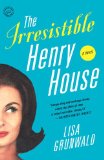Summary | Excerpt | Reading Guide | Reviews | Beyond the Book | Read-Alikes | Genres & Themes | Author Bio

A Novel
by Lisa GrunwaldThis article relates to The Irresistible Henry House
All it took was the unexpected image of a cute, bare-bottomed baby to set the wheels of
The Irresistible Henry House in motion. While Lisa Grunwald was researching another book, she happened upon an online exhibition detailing the history of Cornell University's home economics program which ran from 1900-1969. Originally established as a way to apply science in areas of home, farm, and family, Cornell's home ec. program implemented the use of live babies to mirror real-life domestic settings.
Incredible? Though it's too outrageous to imagine the use of a live baby as a teaching tool in today's educational settings, that's precisely what went on in the "practice apartments" of Cornell's home economics program back in 1919. According to the Cornell site, the first practice baby was named Dicky Domecon, short for "domestic economy."
Borrowed from area orphanages and child welfare agencies, these practice babies
were used to "replicate the full domestic experience" and to enact "the scientific art of childrearing." Because Domecon babies were raised under efficient conditions and with the latest in scientific child-rearing approaches, they were highly sought out by adoptive parents after they reached toddlerhood.
However, with changes in the field of child development - such as the development of attachment theory and the popularization of Dr. Spock's psychological/emotional approach - mothering philosophies shifted away from the strictly scientific and the demand for and interest in such home economic programs fizzled. Cornell's program ended in 1969 but there were other such programs throughout the country.
As a great companion piece for The Irresistible Henry House, try this 1951 promotional video for the home ec program at the Iowa State Teacher's College (glimpse a practice baby around minute 10):
The video may take a few moments to load. If you don't see anything, please check to make sure your computer is not blocking content from video sources.)
Image above: Bobby Domecon, 1920
Filed under Cultural Curiosities
![]() This "beyond the book article" relates to The Irresistible Henry House. It originally ran in March 2010 and has been updated for the
August 2011 paperback edition.
Go to magazine.
This "beyond the book article" relates to The Irresistible Henry House. It originally ran in March 2010 and has been updated for the
August 2011 paperback edition.
Go to magazine.
Your guide toexceptional books
BookBrowse seeks out and recommends the best in contemporary fiction and nonfiction—books that not only engage and entertain but also deepen our understanding of ourselves and the world around us.